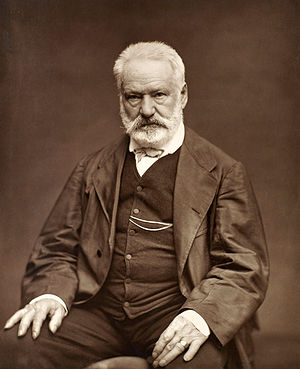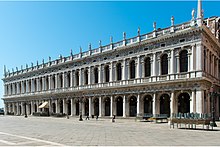Portal:Europe
| Main | Geography | Projects |
|
|
Europe is a continent located entirely in the Northern Hemisphere and mostly in the Eastern Hemisphere. It comprises the westernmost peninsulas of the continental landmass of Eurasia, and is bordered by the Arctic Ocean to the north, the Atlantic Ocean to the west, the Mediterranean Sea to the south, and Asia to the east. Europe is commonly considered to be separated from Asia by the watershed of the Ural Mountains, the Ural River, the Caspian Sea, the Greater Caucasus, the Black Sea, and the waterways of the Turkish Straits. Although much of this border is over land, Europe is generally accorded the status of a full continent because of its great physical size and the weight of history and tradition.
Europe covers about 10,180,000 km2 (3,930,000 sq mi), or 2% of the Earth's surface (6.8% of land area), making it the second smallest continent (using the seven-continent model). Politically, Europe is divided into about fifty sovereign states, of which Russia is the largest and most populous, spanning 39% of the continent and comprising 15% of its population. Europe had a total population of about 741 million (about 11% of the world population), as of 2018. The European climate is largely affected by warm Atlantic currents that temper winters and summers on much of the continent, even at latitudes along which the climate in Asia and North America is severe. Further from the sea, seasonal differences are more noticeable than close to the coast.
The history of Europe concerns itself with the discovery and collection, the study, organization and presentation and the interpretation of past events and affairs of the people of Europe since the beginning of written records. During the Neolithic era and the time of the Indo-European migrations, Europe saw human inflows from east and southeast and subsequent important cultural and material exchange. The period known as classical antiquity began with the emergence of the city-states of ancient Greece. Later, the Roman Empire came to dominate the entire Mediterranean basin. The fall of the Roman Empire in AD 476 traditionally marks the start of the Middle Ages. Beginning in the 14th century a Renaissance of knowledge challenged traditional doctrines in science and theology. Simultaneously, the Protestant Reformation set up Protestant churches primarily in Germany, Scandinavia and England. After 1800, the Industrial Revolution brought prosperity to Britain and Western Europe. The main European powers set up colonies in most of the Americas and Africa, and parts of Asia. In the 20th century, World War I and World War II resulted in massive numbers of deaths. The Cold War dominated European geo-politics from 1947 to 1989. After the fall of the Iron Curtain, the European countries grew together.
The culture of Europe is rooted in the art, architecture, film, different types of music, economic, literature, and philosophy that originated from the continent of Europe. European culture is largely rooted in what is often referred to as its "common cultural heritage".
The economy of Europe comprises more than 744 million people in 50 countries. The formation of the European Union (EU) and in 1999, the introduction of a unified currency, the Euro, brings participating European countries closer through the convenience of a shared currency and has led to a stronger European cash flow. The difference in wealth across Europe can be seen roughly in former Cold War divide, with some countries breaching the divide (Greece, Estonia, Portugal, Slovenia and the Czech Republic). Whilst most European states have a GDP per capita higher than the world's average and are very highly developed (Liechtenstein, Luxembourg, Monaco, Andorra, Norway, Sweden, Denmark, Netherlands, Switzerland, United Kingdom, Ireland, Germany), some European economies, despite their position over the world's average in the Human Development Index, are poorer.
Featured article -

The Palace of Queluz (Portuguese: Palácio de Queluz, Portuguese pronunciation: [kɛˈluʃ]) is an 18th-century palace located at Queluz, a city of the Sintra Municipality, in the Lisbon District, on the Portuguese Riviera. One of the last great Rococo buildings to be designed in Europe, the palace was conceived as a summer retreat for King Joseph I's brother, Peter of Braganza, later to become husband and king jure uxoris (as King Peter III) to his own niece, Queen Maria I. It eventually served as a discreet place of incarceration for Maria I, when she became afflicted by severe mental illness in the years following Peter III's death in 1786. Following the destruction of the Palace of Ajuda by fire in 1794, Queluz Palace became the official residence of the Portuguese Prince Regent John, and his family, and remained so until the royal family fled to the Portuguese colony of Brazil, following the French invasion of Portugal (1807).
Work on the palace began in 1747 under Portuguese architect Mateus Vicente de Oliveira. Despite being far smaller, the palace is often referred to as the "Portuguese Versailles." From 1826, the palace slowly fell from favour with the Portuguese sovereigns. In 1908, it became the property of the state. Following a serious fire in 1934, which gutted one-third of the interior, the palace was extensively restored, and today is open to the public as a major tourist attraction. (Full article...)
Featured location -
The Marciana Library or Library of Saint Mark (Italian: Biblioteca Marciana, but in historical documents commonly referred to as the Libreria pubblica di san Marco) is a public library in Venice, Italy. It is one of the earliest surviving public libraries and repositories for manuscripts in Italy and holds one of the world's most significant collections of classical texts. It is named after St Mark, the patron saint of the city.
The library was founded in 1468 when the humanist scholar Cardinal Bessarion, bishop of Tusculum and titular Latin patriarch of Constantinople, donated his collection of Greek and Latin manuscripts to the Republic of Venice, with the stipulation that a library of public utility be established. The collection was the result of Bessarion's persistent efforts to locate rare manuscripts throughout Greece and Italy and then acquire or copy them as a means of preserving the writings of the classical Greek authors and the literature of Byzantium after the fall of Constantinople in 1453. His choice of Venice was primarily due to the city's large community of Greek refugees and its historical ties to the Byzantine Empire. The Venetian government was slow, however, to honour its commitment to suitably house the manuscripts with decades of discussion and indecision, owing to a series of military conflicts in the late-fifteenth and early-sixteenth centuries and the resulting climate of political uncertainty. The library was ultimately built during the period of recovery as part of a vast programme of urban renewal aimed at glorifying the republic through architecture and affirming its international prestige as a centre of wisdom and learning. (Full article...)
List of featured locations
|
|---|
Featured portrait
 |
In the News
- 20 January 2025 – Russian invasion of Ukraine
- Attacks in Russia during the Russian invasion of Ukraine
- Ukrainian drones attack industrial facilities in Tatarstan, Russia, prompting the Federal Air Transport Agency to temporarily suspend flights from Kazan International Airport and Begishevo Airport. (ABC News)
- 20 January 2025 – 2024 Southport stabbing
- Axel Rudakubana pleads guilty to all 16 charges - including three of murder - in relation to the mass stabbing he committed in Southport, Merseyside, United Kingdom in July. He is due to be sentenced on Thursday. (ITV News)
- 20 January 2025 –
- Eight people are killed and seven more are injured in an arson attack at a nursing home in Barajevo, Belgrade, Serbia. (Reuters)
- 18 January 2025 – Russian invasion of Ukraine
- Kryvyi Rih strikes
- Four people are killed and 14 others are injured in a Russian ballistic missile strike on Kryvyi Rih, Ukraine, according to the Governor of Dnipropetrovsk Oblast Serhiy Lysak. (Euronews)
Updated: 21:05, 20 January 2025
Categories
Featured biography -
David Robert Jones (8 January 1947 – 10 January 2016), known professionally as David Bowie (/ˈboʊi/ BOH-ee), was an English singer, songwriter, musician and actor. Regarded as one of the most influential musicians of the 20th century, Bowie was acclaimed by critics and musicians, particularly for his innovative work during the 1970s. His career was marked by reinvention and visual presentation, and his music and stagecraft has had a significant impact on popular music.
Bowie developed an interest in music from an early age. He studied art, music and design before embarking on a professional career as a musician in 1963. He released a string of unsuccessful singles with local bands and a self-titled solo album (1967) before achieving his first top-five entry on the UK singles chart with "Space Oddity" (1969). After a period of experimentation, he re-emerged in 1972 during the glam rock era with the flamboyant and androgynous alter ego Ziggy Stardust. The character was spearheaded by the success of "Starman" and its album The Rise and Fall of Ziggy Stardust and the Spiders from Mars (both 1972), which won him widespread popularity. In 1975, Bowie's style shifted towards a sound he characterised as "plastic soul", initially alienating many of his UK fans but garnering his first major US crossover success with the number-one single "Fame" and the album Young Americans (both 1975). In 1976, Bowie starred in the cult film The Man Who Fell to Earth and released Station to Station. In 1977, he again changed direction with the electronic-inflected album Low, the first of three collaborations with Brian Eno that came to be known as the Berlin Trilogy. "Heroes" (1977) and Lodger (1979) followed; each album reached the UK top five and received lasting critical praise. (Full article...)
Featured picture
 |
Related portals
Major Religions in Europe
Northern Europe
Western Europe
Central Europe
Eastern Europe, Balkans and Caucasus
Southern Europe
Featured panorama
 |
Topics
Associated Wikimedia
The following Wikimedia Foundation sister projects provide more on this subject:
-
Commons
Free media repository -
Wikibooks
Free textbooks and manuals -
Wikidata
Free knowledge base -
Wikinews
Free-content news -
Wikiquote
Collection of quotations -
Wikisource
Free-content library -
Wikispecies
Directory of species -
Wikiversity
Free learning tools -
Wikivoyage
Free travel guide -
Wiktionary
Dictionary and thesaurus


























